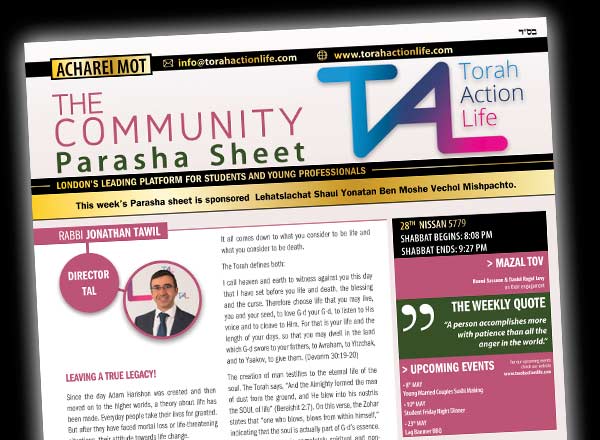
Another year has gone.
What have we achieved in that time?
Where are we at this stage?
What have we done over the last year?
Have we used our time appropriately?
The Gemoro in Brochos 55b teaches us that if someone hasn’t seen his friend for twelve months, he should recite the Brocho of “”Boruch mechayei hameisim”.
The Maharsh there explains that during the twelve month period, we have passed a Rosh Hashono, and during that time we were judged whether we would live or die.
Therefore, after the Yom HaDin, we acknowledge the fact that a friend of ours has been judged and found worthy of life … so we recite a Brocho to praise Hashem that his life was spared.
The Meforshim ask that surely it would be more appropriate to make the blessing of HaGomel, which implies that a life was spared, unlike the blessing of Mechayei meisim, which denotes a more drastic message, as if the man had been granted a new life.
A revival from death.
Really?
It must be that after Rosh Hashono we don’t merely continue to live.
No. Our existence ceases at the end of the year and we actually need to plead for another year of life.
Thus the Sifrei Chaim are also open on the day of judgement, as even those that are alive need to be reinserted in the Book of Life.
Reb Yonoson Eibshitz further underscores this point by going one stage further.
In Zichronos we daven “zeh hayom techilas ma’asecho’. This day is the first day of creation. Wouldn’t it be more correct to say ‘this is the same day as Brias Ho’olom?
Similarly, after blowing the Shofar, we cry out ‘Hayom haras olom’ today is the first day of creation. Surely we should say this in the past tense, today is the day when the world was created?
Clearly, Rosh Hashono every year is the day when everything is renewed and starts again.
The world and even our lives begin anew.
Allow me to use a simple analogy to illustrate why we need to plead sincerely for a new year.
If we have a car that has served us loyally; its dents and knocks show its years of service, but we bear with. They are badges of familiarity that we can live with.
However, when purchasing a new car, we will inspect it with a fine toothcomb, not wanting any scratches or impediments.
Because when we buy a new product, we want the best.
Similarly, on Rosh Hashono, HKBH is giving us a new life and we need to make sure we are completely fresh and clean.
May we all be zoicheh to be inscribed in the Sefer Hachaim.







